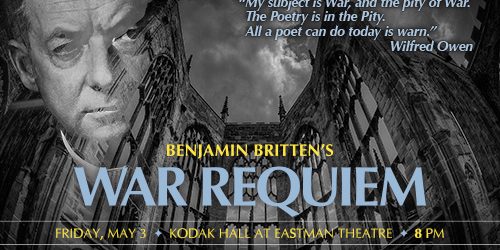Benjamin Britten’s War Requiem, a powerful choral masterpiece denouncing war and honoring the fallen, will be presented by the Eastman School of Music at 8 p.m. Friday, May 3, in Kodak Hall at Eastman Theatre.
Requiring two orchestras, two choruses, and soloists, War Requiem is a large-scale work that intersperses Britten’s setting of the traditional Latin Mass for the Dead with poems by English poet and World War I soldier Wilfred Owen, who was killed one week before the Armistice was signed. This concert will feature Eastman School student soloists Laura Osgood, soprano, Matthew Valverde, tenor, and Benjamin Curtis, baritone, the Eastman Rochester Chorus, Eastman Chorale, Eastman Philharmonia, and Eastman Children’s Chorus. The conductor will be William Weinert.
“The War Requiem is Britten’s most significant concert work, and the work that brought him the most widespread acclaim during his lifetime. It is also the most important musical work ever written with an anti-war message,” said Weinert. “The genius of Britten’s artistry is his ability to present complex music and profound poetry with the kind of perfect clarity that makes an immediate and unforgettable impact on listeners.”
There will be a pre-performance lecture by Assistant Professor of Musicology Michael Allan Anderson from 7 to 7:30 p.m. in the School’s Ray Wright Tribute Room (Room 120).
The War Requiem was commissioned to celebrate the opening of the new Coventry Cathedral, built to replace the 14th-century structure destroyed during a World War II bombing raid in 1940. The work’s premiere on May 30, 1962, was a triumph, and subsequent performances were acclaimed by both critics and audiences in England and abroad.
The 90-minute work consists of six movements. The musicians and singers are divided into three groups that alternate and interact with each other throughout the piece. All the ensembles and soloists join together for the only time in the final movement.
The scope of the piece and Britten’s dramatic juxtaposition of traditional texts and harmonies with Owen’s graphic poetry build a powerful work that echoes Britten’s anti-war convictions. To symbolize wartime losses across boundaries and the importance of reconciliation, Britten wrote the piece for three specific soloists: German baritone Dietrich Fischer-Dieskau, Russian soprano Galina Vishnevskaya, and British tenor Peter Pears.
War Requiem was the basis of a 1988 British film, with Sir Laurence Olivier in his last acting appearance as an old soldier reminiscing about war’s horrors.
This year marks the 100th anniversary of Britten’s birth.
# # #
